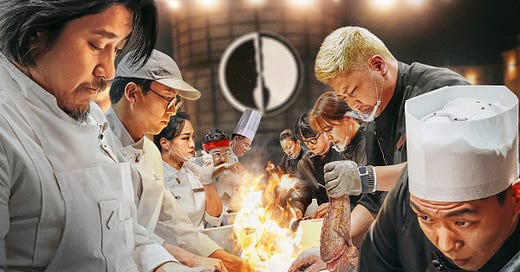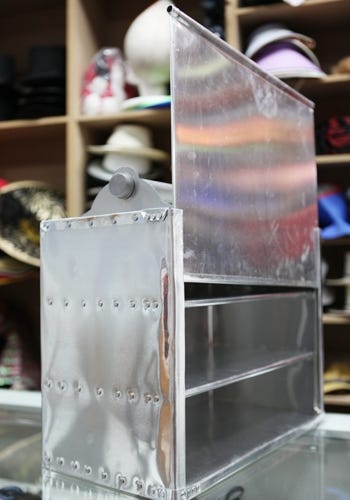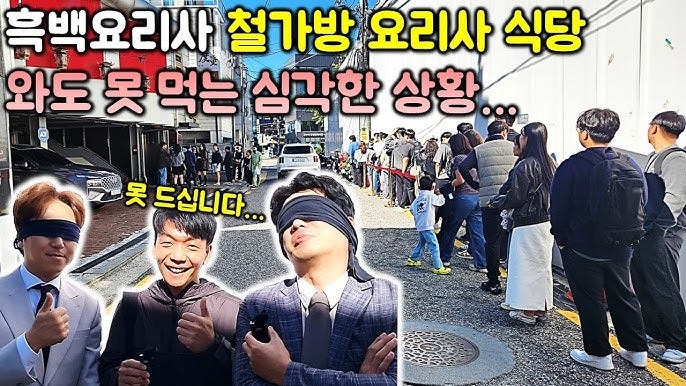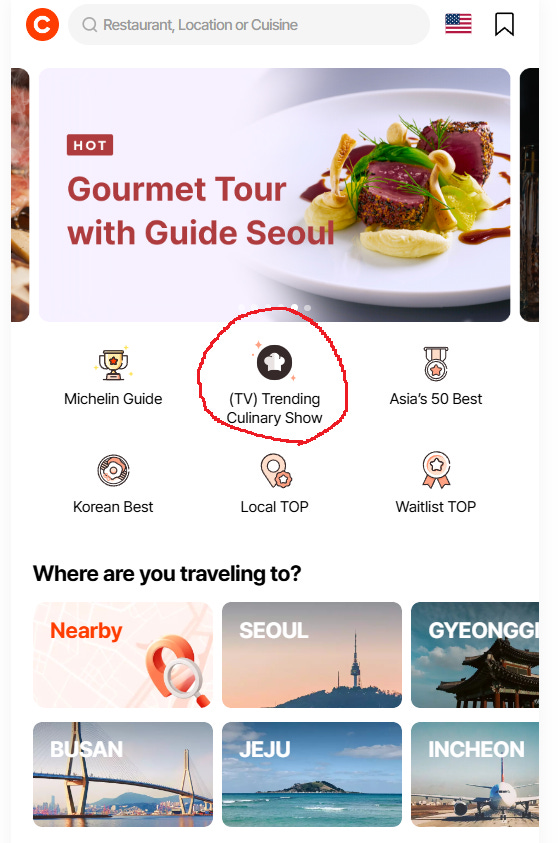I used to watch a lot of cooking shows when I was younger. The original Japanese Iron Chef series that aired on the Food Network years ago is one of my favorite shows of all time, regardless of genre. Then I stopped watching cooking shows all together because I generally lost interest, and I don’t like people yelling and screaming and calling people names. It’s very off-putting.
Then I heard about this new Korean cooking competition show on Netflix that was the talk of the town whole country. Oh? The show’s purported concept was intriguing, so I started watching it. I liked it a lot until the 5th episode.
I thought I would explain some of the terms used in the show and the nicknames of the “Black Spoon” chefs. It’s not because the English translations were bad, but because there were some modern and slang words not found in dictionary that need more clarification for better understanding. Frankly, had Netflix asked me to translate the nicknames, I don’t know what I would have done with some of them. I mean, you can’t explain what a 돌아이 (“Cooking Maniac”) is in one word, but you can’t use a whole paragraph explaining what it is on a TV screen whenever he comes out, you know?
OK, with that, let’s start with the title itself. In Korean, it’s called 흑백요리사. Literally, it’s “Black/White Chefs.” The term “born with a silver spoon in your mouth” is basically where this comes from. In Korean, we call someone who’s born into a rich family and has a privileged life 금수저, or “Gold Spoon.” On the opposite side, someone who has to work hard for every penny is called 흙수저, or “Dirt Spoon.”
Since the pronunciation for both 흙 and 흑 is exactly the same, the showrunners did a wordplay with the 흑수저 (Black Spoon) insinuating that they come from rather humble backgrounds and have no name-brand power. Well, if you have a Black Spoon on one hand, then you can’t have a “Gold Spoon” on the other, right? It had to be “White Spoon.”
Second, they started filming back in January and the final match was taped in April. I thought it was weird when I was watching the first few episodes and there were winter-only ingredients.
Third, the judges. The older gentleman is Baik Jong-won (백종원), the most successful restauranteur and businessman in Korea. Through his company The Born, he owns something like 21 different franchise restaurant brands and has thousands of franchisees in Korea and worldwide. He probably has traveled more than anyone in Korea for the sole purpose of eating.
The younger gentleman is Ahn Seong-jae (안성재), the only Michelin 3-star chef in Korea. He was born in Korea and his family immigrated to the US when he was 12. He said that he originally wanted to be an auto mechanic but ended up attending the Le Cordon Bleu in Pasadena, trained at Urasawa, what used to be the most expensive restaurant in LA (Beverly Hills) and later at the legendary French Laundry in Napa Valley. Before that, he served in Iraq as a part of the US Armed Forces. He closed his 3-star restaurant Mosu Seoul a few months ago. There is no Michelin 3-star restaurant in Seoul currently.
Now let’s get to some of the Black Spoon chefs’ nicknames.
Napoli Matfia (나폴리 맛피아)
The “맛, Maht” of Matfia means “flavor” or “taste.” Another wordplay.
Cooking Maniac (요리하는 돌아이)
Now, this is difficult. If you have watched Korean TV shows, you have invariably come across this word, either spelled as “돌아이” or “또라이.” The etymology of this word is unclear, for it looks like it’s been in use since the early Joseon days a few hundred years ago.
It refers to someone who is: slightly below average intelligence (traditional meaning), a little crazy, weird, rebellious, unpredictable, “out there,” off-kilter, a maverick… you get the picture. However, in any kind of work that requires a lot of creativity, like cooking for instance, 돌아이 can be used as a positive, complimentary term. I think one of the judges, Ahn, even said something to the effect of “preferring a 돌아이 in the kitchen” in one episode.
The “Bibim King” is a bit of a 돌아이, if you ask me, even though I can’t really call him that because he seems older than me. But if he were decisively younger, I could and definitely would call him a bit of a 돌아이. He apparently had his name legally changed to 비빔 (act of mixing things, food generally) through court proceedings. Yeah, his real name is You, Bibim (유비빔). His last name just had to be You or Yoo… (Can’t make this stuff up.)
And of course, you could’ve said that this “Chirpy” was a 돌아이 too. No explanation why necessary.
Self-made Chef (철가방 요리사)
철 (steel) + 가방 (bag, or anything you can carry stuff in) = this stainless steel (or aluminum) box with a handle on top.
Long before Door Dash, Uber Eats, or any other food delivery service, most Chinese restaurants in Korea used to deliver food in this steel box to customers. Through sweltering heat, bitter cold, rain or shine, through snowstorms. And most of the times (we’re talking 70s to 90s and probably 2000s too), people who made deliveries were teenage boys who either came from a very poor family or didn’t have one in the first place. They would often work for food and shelter, plus a modest stipend.
In a manner of speaking, this “철가방, or steel box” became synonymous with “delivery boys” who, more likely than not, grew up poor and/or had a rough childhood. So, as soon as I saw him and his nickname, I found myself rooting for him although I thought he had virtually no shot at winning it—maybe not even make it out of the preliminary round. (You’ll have to watch the show to see how he did.)
It turns out that he grew up in an orphanage before his grandmother took him in. He didn’t couldn’t attend school like the other kids, started delivery for a local Chinese restaurant when he was 16… And now he’s an owner/chef of a very popular Chinese restaurant in downtown Seoul. There is a now a 2 to 3-hour wait just to get a ticket to be able to make a reservation at his restaurant.
Auntie Omakase #1 (이모카세 1호)
Omakase (お任せ) is a Japanese word used at restaurants (usually at sushi joints), meaning “Up to you, Chef.” The chef then will take care of the entire menu from the start to finish, depending on what’s available. There is usually a fixed price per person. If you see this “Omakase” word on the menu, it’s probably a good idea to go with that, especially if you’re in an unfamiliar environment, provided of course that the price isn’t outrageous.
The Korean word 이모 (ih-mo) means Aunt, but specific to your mom’s sister, not dad’s. There’s a separate word for dad’s sister, which is 고모 (goh-mo).
Often times, younger customers, mostly in their 20s and early 30s, will call to friendly lady owners and/or servers at restaurants as “ih-mo,” invoking that homey feel. I myself have done it a few times. I don’t know if this is true in other countries, but in Korea you always feel closer to your mom’s sisters (ih-mo) than your dad’s sisters (goh-mo). It’s just one of those cultural idiosyncrasies.
Ih-mo-kase runs a couple of Korean home-cook style restaurants, with one of them being a drinking bar with Korean anju (안주, accompanying food for drinking) for 50,000 KRW (~$37) per person, and the other a noodle soup specialty restaurant at Gyeongdong Market (경동시장), the largest traditional market in Seoul by square footage. I’m hearing it’s nearly impossible to get a table or reservation at either place, and the entire Gyeongdong Market is currently being bombarded with customers because of Ih-mo-kase, benefitting all vendors there.
If you’re so inclined, you can take a look at this foodie couple’s YouTube video who was able to visit both of her restaurants.
Comic Book Chef (만찢남)
Korean youngsters today abbreviate way too much. They shorten everything! It’s hard for me to keep up with all the latest lingo—and when I finally do, they’re already old news and no longer in use. 만찢남 is short for 만화를 찢고 나온 남자, literally “a cartoon character (a man) who’s torn the pages out of a comic book and appeared in real life.” This usually refers to a very handsome actor, model, or K-pop idol.
But in the show (not to say that he’s not good looking or anything), 만찢남 is literally a man who’s torn a page out of a comic book and used it as his cooking teacher and inspiration.
The dining scene in Seoul is in a complete flux right now because of the Netflix show. “Catchtable,” the restaurant reservation app in Korea, has a separate button/link for the restaurants owned and operated by the Culinary Class Wars chefs. Interestingly, all of the Black Spoon chefs’ restaurants are fully booked, I’m told, whereas there are some availabilities for the White Spoon chefs. The running joke in Seoul right now is that there is actually one restaurant where it’s relatively easier to make a reservation. Edward Lee’s 610Magnolia in Louisville, KY. Plane ticket not included.
You can click this link to be taken to the app’s webpage although reservations have to be made on the phone app.
And as a final note, Korean comedians are having an absolute field day with making parodies of the Netflix show.

















Thank you for going so ham on this